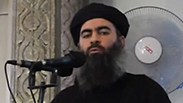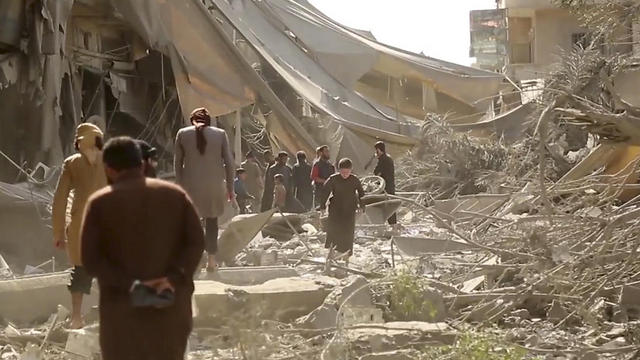
Islamic State (ISIS) leader Abu Bakr Al-Baghdadi exhorted followers on Thursday to stand fast and keep fighting in his first purported audio communication in almost a year during which his jihadist group lost much of its self-proclaimed "caliphate."
The date of the 46-minute recording, released via the Al-Furqan news organization, which is linked to the jihadist group, was not clear. But Baghdadi makes reference to North Korean threats against Japan and United States and the recapture two months ago of Mosul by US-backed Iraqi forces.
Since Baghdadi proclaimed the caliphate stretching across Iraq and Syria in 2014, Iraqi forces have retaken a string of cities in western and northern Iraq including Mosul, where Baghdadi made his announcement from the city's El Nuri mosque.
Western-backed Syrian forces are also thrusting into the eastern Syrian city of Raqqa, Islamic State's operational headquarters from where it plotted many of the attacks that have killed hundreds of people around the world.
"Beware of retreat, or the feeling of defeat, beware of negotiations or surrender. Do not lay down your arms," Baghdadi said, referring to followers in Iraq, Syria, Saudi Arabia, North Africa and elsewhere in Africa.
Baghdadi called on the ISIS fighters to continue their terror attacks in the West and "fan the flames of war on your enemies, take it to them and besiege them in every corner, and stand fast and courageous."
"Increase blow after blow, and make the media centers of the infidels, and where they wage their intellectual wars, among your targets," he added.
The fall of Mosul in July effectively marked the end of the Iraqi half of Baghdadi's "caliphate" even though Islamic State continues to fight in some territory outside of Mosul, the largest city they came to control in both Iraq and Syria.
An ISIS branch in Libya was also defeated last year in the city of Sirte, where they had set up a North African beachhead in 2014. In Egypt's northern Sinai, another affiliated militant group is still fighting Egyptian military forces.
Despite the defeats ISIS suffered over the past year, Baghdadi asserted that the events on the ground "are the best proof of the failure of the coalition of infidels who stand against the steadfastness of the soldiers of the caliphate."
He noted some nations of infidels took advantage of the war on ISIS to take over new territories, but he called on ISIS fighters in Syria to "hold on. Allah will help you against your enemy, if you are patient. The Syrian and Kurdish regimes will become extinct. They are too despicable to fight you."
Baghdadi called on Sunni Muslims in Syria, Iraq, Yemen and everywhere else to rise up and shake the "dust of humiliation" off their clothes.
"With God's will and his strength, we are staying determined, patient...The abundance of killing will not stop us," Baghdadi said in the audio recording.
Officials have said they believed it could take years to capture or kill Baghdadi as he is thought to be hiding in a vast swathe of sparsely-populated desert between Mosul and Raqqa, where attacking drones are easy to spot.
The United States has offered a $25 million bounty for information that would locate Baghdadi.
"The US, which presents itself as the only world power, is losing its status as one that stands at the head of the world's nations. It has become a fatigued country preoccupied by massive debts—which sets the ground for its collapse. This will drag other countries into the abyss," Baghdadi also said in the recording.
He added that "Russia is taking advantage of the American weakness to show it is the alternative world power," further taunting that "the US has no voice."
The audio release, much of which is dedicated to religious scriptures, comes amid growing speculation over the fate of the Baghdadi, whose last recorded speech was issued in early November 2016, two weeks after the start of the battle for Mosul, when he urged his followers to fight the "unbelievers" and "make their blood flow as rivers."
Russia's defense ministry said earlier this year it may have killed Baghdadi when one of its air strikes hit a gathering of senior Islamic State commanders on the outskirts of the Syrian city of Raqqa but Washington said it could not corroborate the death and Western and Iraqi officials were skeptical.


















